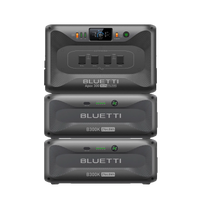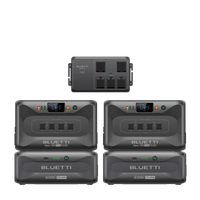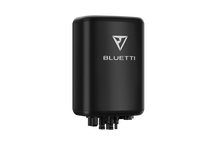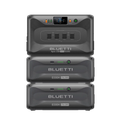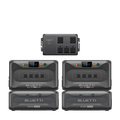Your cart is empty
Shop our productsAs the depletion of non-renewable resources and growing concern for the environment continue to be major issues in today's world, the importance of renewable energy sources has significantly increased as a viable alternative.
Solar energy is a renewable energy source that's gained popularity over the years.
Solar systems are becoming more accessible to the average consumer, and they are a practical solution for those looking to reduce their reliance on traditional power sources.
In this article, we will discuss the battery capacity in a solar system and why it is crucial.
What is Battery Capacity?
Battery capacity is the amount of energy that a battery can store, typically measured in kilowatt-hours (kWh). This capacity is the primary factor that determines how much energy a battery can deliver.
Battery capacity is a crucial factor in solar systems, as it determines how much energy can be stored during the day to be used at night or during low sunlight periods.
Why is Battery Capacity Important in a Solar System?

The sun is not always shining, and solar panels cannot produce electricity at night. Therefore, energy storage is crucial in solar systems. Battery capacity plays a significant role in this storage process.
The total energy that can be stored is determined by the battery capacity, and this, in turn, determines the size of the solar system needed to provide the desired level of energy.
In a solar system, batteries are charged during light hours when the sun is shining, and the excess energy generated by the solar panels is stored in the batteries. At night, when the solar panels are not generating any electricity, the energy stored in the batteries is used to power the home or business.
If the battery capacity is low, the solar system will not be able to store enough energy to power the home or business during periods of low sunlight. This will result in the need for a larger solar system or a reliance on traditional power sources.
The Importance of Battery Type in Solar Systems
There are many different types of batteries used in solar systems, including lead-acid, lithium-ion, and flow batteries. Each of these batteries has its unique features and characteristics, making them suitable for specific applications.
Lead-acid batteries are the most commonly used batteries in solar systems, as they are relatively inexpensive and have been in use for decades. However, lead-acid batteries have a low energy density, which means they have a limited capacity and require regular maintenance.
Lithium-ion batteries are the most widely used batteries in portable electronics due to their high energy density and longer lifespan. These batteries have a higher upfront cost but require less maintenance and are more efficient in terms of energy storage and discharge.
Flow batteries are another type of battery used in solar systems. These batteries store energy in tanks of liquid electrolytes and are highly scalable, making them ideal for large solar systems. Flow batteries are also more durable and have longer lifespans than many other types of batteries, making them an excellent option for long-term energy storage.
The Importance of Battery Management in Solar Systems
Battery management is another critical aspect of solar systems. Battery management systems (BMS) are used to monitor the state of the battery and optimize its performance.
BMS ensures that the battery is not overcharged, which can damage the battery, and prevents over-discharging, which can reduce its lifespan.
Battery management systems also provide critical information about the battery's performance, including its state of charge, voltage, and temperature.
This information is used to optimize the solar system's performance and ensure that it operates efficiently and safely.
Which Battery Type is Best for Solar Systems?

LiFePO4 batteries have a high energy density and can store a significant amount of energy in a relatively small and lightweight package.
They also last for quite a long time and can be charged and discharged thousands of times without significant degradation.
This makes them ideal for use in solar systems, where they can be used to store energy generated during light hours for use at night or during periods of low sunlight.
One of the significant advantages of LiFePO4 batteries is their safety. Unlike other types of lithium-ion batteries, LiFePO4 batteries are much less prone to overheating and thermal runaway.
This is because they have a stable chemical structure and do not contain volatile or flammable materials. This makes them a much safer option for use in solar systems and other applications where safety is a significant concern.
Another advantage of LiFePO4 batteries is their resistance to degradation. They can be charged and discharged at higher rates without experiencing significant capacity loss, making them ideal for use in high-performance applications.
Additionally, LiFePO4 batteries are resistant to overcharging and can be left at full charge for extended periods without significant degradation, unlike other types of lithium-ion batteries.
In terms of cost, LiFePO4 batteries are typically more expensive than traditional lead-acid batteries.
However, their longer lifespan and higher efficiency can make them a more cost-effective option in the long run, particularly for high-performance applications.
Overall, lithium iron phosphate batteries are an excellent option for use in solar systems. They offer high energy density, long lifespan, safety, and resistance to degradation, making them a reliable and efficient option for storing energy generated by solar panels.
Final Thoughts
Battery capacity is a crucial factor in solar systems. It determines how much energy can be stored and used during periods of low sunlight.
Battery type and management are also essential considerations in solar systems. The type of battery used will affect the system's performance and cost, while proper battery management is critical to ensure that the battery operates efficiently and safely.
Shop products from this article
Be the First to Know
You May Also Like

What Does a 30% Federal Solar Tax Credit Mean and How to Apply?
Governments around the world are offering programs that encourage homeowners to switch to solar energy. Among the most notable programs is the 30% Federal Solar Tax Credit. It reduces your...

Deadly Flooding Devastates U.S. South and Midwest — What You Need to Know















